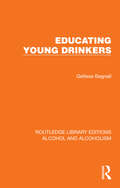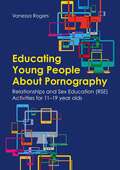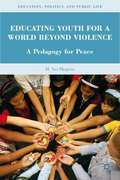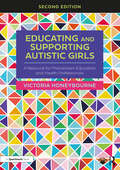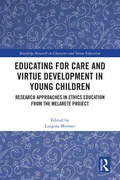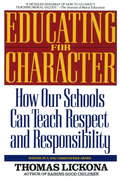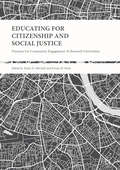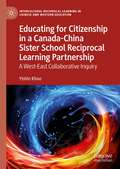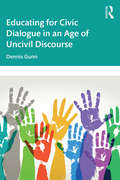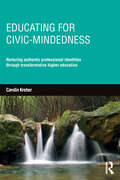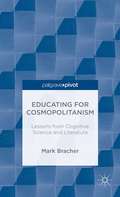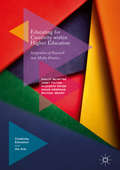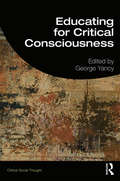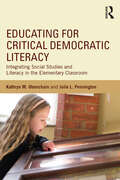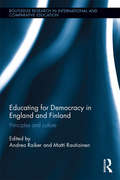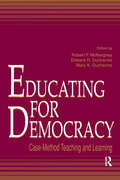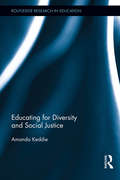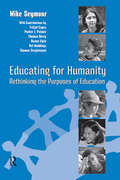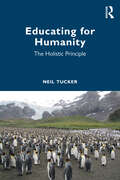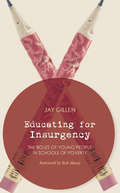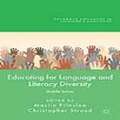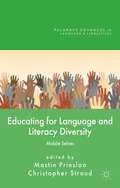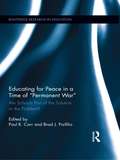- Table View
- List View
Educating Young Drinkers (Routledge Library Editions: Alcohol and Alcoholism)
by Gellisse BagnallYoung people are regarded as vulnerable by the media – often exaggeratedly so. In the early 1990s they had become the focus of public concern regarding alcohol misuse. But attempts to educate teenagers into using alcohol sensibly have often been counterproductive. What kind of approach should alcohol education take to produce effective results? Originally published in 1991, Educating Young Drinkers outlines the reasons for the lack of success in previous experiments in alcohol education at the time. It focuses on an activity-based primary intervention with young people as a possible solution. With the active involvement of school teachers, Gellisse Bagnall had developed a relevant and pupil-oriented programme designed for easy classroom use. The evaluation of the results of this experiment demonstrated that non-didactic alcohol education can be made to work. In emphasizing the political and theoretical assumptions made in devising health education policies, Educating Young Drinkers was directly relevant to social scientists within alcohol and/or health education, as well as to policy makers. It would also be a valuable source of information for teachers and all those working with young people.
Educating Young Giants
by Nancy Pine"Educating YoungGiants" carries readers into Chinese and American elementary and high school classrooms, and highlights the big differences between schooling in China and the United States. Drawing from many experiences in schools both in China and Americaand conversations with students, teachers, and parents, Nancy Pinereveals how these two countries need to extract themselves from outmoded practice and learn from each other's strengths. "
Educating Young People About Pornography: Relationships and Sex Education (RSE) Activities for 11-19 year olds
by Vanessa RogersAt a time when pornography is more accessible than ever and many young people are inadvisably turning to pornography to learn about sex and relationships, this book explores what pornography is, the politics behind pornography, how it can affect both sexual and non-sexual relationships and the effects of pornography on mental health. The book also covers the important wider topics of the making and sharing of inappropriate images and over exposure to porn contributing to what is becoming known as 'rape culture'. It includes full lesson plans, activities, photocopiable materials and clear information on how to implement the programme, including outlines for staff CPD sessions and parent workshops.This book will be vital for PSHE teachers, senior leadership teams, pastoral care teams, school counsellors, youth workers, school nurses, and anyone who might be involved in sex education provision for young people.
Educating Youth for a World beyond Violence
by H. Svi ShapiroIn a time of unprecedented social and economic crisis, this book represents a challenge to the orthodoxy that shapes our vision of educational purpose. It argues that now, more than ever, there is a moral imperative for educators to assume responsibility for helping to bring about a culture of peace and non-violence.
Educating a Diverse Nation
by Clifton ConradEducating a Diverse Nation turns a spotlight on colleges and universities dedicated to serving minority and low-income students of all ages. It highlights innovative programs that are advancing persistence and learning, and it identifies specific strategies for empowering nontraditional students to succeed despite many obstacles.
Educating and Supporting Autistic Girls: A Resource for Mainstream Education and Health Professionals
by Victoria HoneybourneAutistic girls, especially those educated in mainstream environments, have often been missed or misdiagnosed. There is now, however, greater awareness of how autism can present in females, why these girls can remain ‘invisible’, and what education and health professionals can do to provide better support. Fully revised and updated, this practical book shines a light on the insights, opinions and experiences of autistic girls and women, providing a rich insight into school life from an autistic perspective. It explores the difficulties and disadvantages that autistic girls can face in educational settings and offers guidance on how to best support them, with a wealth of strategies reflecting good practice in the field of autism and education. The resource also contains a broad range of worksheets and activities on key issues and includes new sections on anxiety, masking, home life, social media, gender and sexual identity. Key features include: A wealth of case studies to illustrate different topics Guidance on best practice when working with autistic girls New audits to help staff and pupils to identify strengths and areas to improve Easy-to-implement strategies and tips to help professionals adapt to environments and policies for autistic students Activities and resources for young autistic females to support them in developing self-awareness, coping strategies and learning skills With the voices of autistic girls and young women woven throughout, drawing upon their experiences of education – from learning and communication, to friendships, transitions and interpreting the world – this is an essential resource for education and health professionals working with autistic girls, particularly in mainstream environments.
Educating for Care and Virtue Development in Young Children: Research Approaches in Ethics Education from the MelArete Project (Routledge Research in Character and Virtue Education)
by Luigina MortariThis book champions care education in early childhood school contexts, addressing the critical need for an effective and meaningful ethics education grounded in Platonic and Aristotelian reflections on virtues, and ultimately positing a theory of ethics education that connects ancient philosophy to contemporary care thinking.This theory is supported by the empirical findings of the MelArete Project, a 10-year research project in care and virtues education that guides children’s attention to the concepts of care and virtues. Unique amongst contemporary virtue and character approaches, Mortari and her colleagues have developed a rich research base that combines recent educational theories with ancient and continental philosophy.Ultimately arguing for an ethics education centered on care in the wake of our current ethical crisis, the book contributes to a growing body of literature on prominent virtue and character education programs around the world and will therefore appeal to scholars, researchers, and postgraduate students working in moral and values education, ethics education, and educational theory more broadly. Care ethicists and early childhood educators will also benefit from this volume.
Educating for Character: How Our Schools Can Teach Respect and Responsibility
by Thomas LickonaCalls for renewed moral education in America's schools, offering dozens of programs schools can adopt to teach students respect, responsibility, hard work, and other values that should not be left to parents to teach.
Educating for Citizenship and Social Justice
by Krista M. Soria Tania D. MitchellIn this edited volume, authors explore the ways in which departments, programs, and centers at public research universities are working to better engage students in the work of citizenship and social justice. The chapters in this book illuminate the possibilities and challenges for developing community engagement experiences and provide evidence of the effects of these efforts on communities and undergraduate students' development of citizenship outcomes. This text reveals how important the integration of our intentions and actions are to create a community engaged practice aimed towards justice.
Educating for Citizenship in a Canada-China Sister School Reciprocal Learning Partnership: A West-East Collaborative Inquiry (Intercultural Reciprocal Learning in Chinese and Western Education)
by Yishin KhooThis book enriches the discourse around Global Citizenship Education in teacher education through the example of a teacher's experience in a Canada-China Sister School reciprocal learning landscape. Instead of positioning global citizenship teaching and learning as a set of fixed goals to be attained by teachers alone, this book approaches global citizenship teaching and learning as unfinished lifework in progress and as situated curriculum problems to be inquired together by university researchers, school teachers, and students under the spirit of reciprocity and community. This reimagination of narratives, theory, and action start from collaborative and reciprocal learning partnerships among Chinese and Canadian researchers and teachers in the practicality of re-searching and re-enacting the purpose and meanings of twenty-first century education in a Canada-China Sister School setting.
Educating for Civic Dialogue in an Age of Uncivil Discourse
by Dennis GunnEducating for Civic Dialogue in an Age of Uncivil Discourse addresses an urgent challenge—to help students learn the skills of civic engagement—by offering a framework for authentic cosmopolitan education. As an invitation to ongoing civil dialogue with diverse voices in the classroom, the book aims to foster the skills of democratic and global citizenship that allow students to find their voice as local, national, and global citizens outside of the classroom. It suggests practical ways that teachers can promote the skills of attentive listening, intelligent questioning, reasonable positioning, and responsible dialogue in order to encourage authentic civic discourse. It also outlines specific pedagogical strategies designed to foster students’ cosmopolitan competencies as democratic and global citizens.
Educating for Civic-mindedness: Nurturing authentic professional identities through transformative higher education
by Carolin KreberImagined at their best, how might professions contribute most effectively to their local and global communities, and how could higher education support graduates/future professionals in making this contribution? The answer proposed in this book is to educate students for ‘civic-mindedness’, an overarching professional capability grounded in certain dispositions and qualities, ideals, types of knowledge and political emotions. ‘Civic-mindedness’, and its internal counterpart, the practitioner’s self-cultivation, give rise to an engagement with professional practice that is authentic, civic and democratic. The tension between responsiveness or regard for others and regard for self is overcome by recognising that authentic professional identities are constructed through practices around shared purposes and ideals. Drawing on a wide range of theorists including Dewey, Arendt, and Nussbaum, professions are envisaged to play a vital role. Primarily professions support society’s well-being by ensuring access to public goods, such as local and global justice, access to information, health, education, safety, housing, the beauty and sustaining power of the ecological environment, among others. Yet professions also protect the fundamental good of citizen participation in free deliberation and decision-making on issues affecting their lives. The book concludes with a vision of higher education that is transformative of graduates/professionals, pedagogies, professional practices and communities. Issues of increasing social awareness are a key concern for anyone involved in teaching professionals and this book, which builds best practice around a sound theoretical and philosophical framework, will prove both thought-provoking and practical in application.
Educating for Cosmopolitanism: Lessons from Cognitive Science and Literature
by Mark BracherDrawing on developments in cognitive science, Bracher formulates pedagogical strategies for teaching literature in ways that develop students' cognitive capabilities for cosmopolitanism, the pursuit of global equality and justice. Several staple classroom texts, such as Things Fall Apart, provide detailed examples for teaching practices.
Educating for Creativity within Higher Education: Integration of Research into Media Practice (Creativity, Education and the Arts)
by Susan Kerrigan Phillip McIntyre Janet Fulton Elizabeth Paton Michael MeanyThis book provides innovative insights into how creativity can be taught within higher education. Preparing students for employment in a dynamic set of global creative industries requires those students to not only be resilient and entrepreneurial, but also to be locally focused while being globally aware. Therefore it is imperative that they acquire a thorough understanding of creative processes and practice as they try to keep pace with worldwide digital trends. As the creation of media messages is a fundamental aspect of global creative industries, and that numerous concerns practitioners face are based upon a certain understanding of creativity, the authors propose an exploration of what creativity is in terms of research, and then apply it pedagogically. Drawing on extensive empirical research, the authors pose the thought-provoking question of whether creativity can be taught. This volume will be of interest to both students and scholars of creativity and higher education as well as to creatively-based practitioners more widely.
Educating for Critical Consciousness (Critical Social Thought)
by George YancyIn this politically and democratically urgent collection, George Yancy and contributors argue that more than ever, we are in need of classrooms that function "dangerously"—that is, classrooms where people are not afraid to engage in critical discussions that call into question difficult political times. Collectively they demonstrate the ways activist authors and scholars must be prepared to engage in risk and vulnerability as a defense of our democratic right to practice forms of pedagogical transgression. Ideal for scholars and students of critical pedagogy, philosophy of education, and political theory, this collection delineates the necessity of critical consciousness through education, and provides ways of speaking back against authoritarian control of imaginative and critical capacities.
Educating for Critical Democratic Literacy: Integrating Social Studies and Literacy in the Elementary Classroom
by Julie L. Pennington Kathryn M. ObenchainEducating for Critical Democratic Literacy educates pre and in-service elementary school teachers in teaching four key civics concepts through social studies and literacy integration. Written together by both literacy and social studies experts, it is based on a conceptual revision of the notions of civic education and critical literacy called "Critical Democratic Literacy" (CDL). The authors’ dual expertise allows them to effectively detail the applications of their knowledge for teachers, from lesson conception to implementation to assessment. Part I explains the theory and basic principles of CDL and provides background information on the role of democracy in education. Part II consists of four sample lessons designed using the National Council for the Social Studies (NCSS) C3 Framework and the Common Core State Standards for English/Language Arts (CSS ELA) standards. Part III includes a primer explaining the four civic concepts that frame the book. Fully aligned to both the CCSS ELA and NCSS C3 Framework, this timely resource provides future and current teachers with specific lessons and tools, as well as the skills to develop their own rigorous, integrated units of study.
Educating for Democracy in England and Finland: Principles and culture (Routledge Research in International and Comparative Education)
by Matti Rautiainen Andrea RaikerWith the growth of terrorism, instability in the EU following recession, and the acceleration of support for right-wing political parties in Europe, discussions on the nature of democracy and democratic citizenship have never been more important. Exploring the relationship between democratic values, classroom practices and neo-liberalist ideology in England and in Finland, Educating for Democracy argues that it is the role of governments and the education systems they support to create teachers and students who can voice critically appraised judgements to guide their citizenship. With chapters co-written by English and Finnish authors, this book analyses the history and current state of education systems in England and Finland, with reference to other European countries, in order to establish whether they are effective in creating democratically-minded citizens. Recent years have seen decreasing control of educator professionalism as governments have become more concerned about economic growth, and in some cases, survival. The contributors to this volume question whether educators are becoming less effectual as a result, exploring the idea that democracy is a dying concept, and asking whether educators are now simply creating cogs for the neo-liberalistic/capitalist machine. This book will be essential reading for academics and researchers in the fields of teacher education, education studies and comparative education. It will also be of great interest to those concerned with issues surrounding citizenship, democracy and the role of the government in education.
Educating for Democracy: Case-method Teaching and Learning
by Robert F. McNergney Edward R. Ducharme Mary K. DucharmeThis book advocates the use of case methods to promote democratic teaching and learning. Part I speaks directly to teacher educators. The chapters in this part suggest how and why they might use case methods at pre- and in-service levels. Part II presents a set of cases and teaching notes designed to stimulate active consideration of democratic teaching and learning in elementary and secondary schools throughout the United States. These cases can be used with both prospective and practicing teachers. Case methods in education--like those used to prepare practitioners in other professions such as medicine, law, and business--require learners to attend to detail and to exercise judgment as they identify and solve problems. Although each has its own unique variations, case-method approaches in all fields promote careful examination of professional practice. The cases in this book will help teacher educators think anew about many issues related to teaching and learning with cases.
Educating for Diversity and Social Justice (Routledge Research in Education)
by Amanda KeddieEducating for Diversity and Social Justice foregrounds the personal stories of educators who are engaging the space of schooling as a site of possibility for realizing the goals of social justice. It is a book inspired by a vision of education as a practice of freedom where young people – especially those who are marginalized – can learn that they have a voice and the power to change their world for the better. Drawing on the work of US philosopher Nancy Fraser, the book examines issues of justice and schooling in relation to three dimensions: political, cultural and economic. While its focus is on research within three Australian case study schools, the book provides an international perspective of these dimensions of justice in western education contexts as they impact on the schooling performance of marginalized students. Towards greater equity for these students, the book presents a comprehensive scaffold for thinking about and addressing issues of schooling, diversity and social justice. Through practical examples from the case study research, the book illustrates the complexities and possibilities associated with schools providing inclusive environments where marginalized voices are heard (political justice), where marginalized culture is recognized and valued (cultural justice) and where marginalized students are supported to achieve academically towards accessing the material benefits of society (economic justice).
Educating for Humanity: Rethinking the Purposes of Education
by Mike Seymour Henry M. LevinAt a time of profound crises around the world, when social justice, peace, democracy and the environment seem under increasing threat, the promise of "a world for all" seems a viable aspiration for education. Ample evidence from many schools today, and dating back throughout the last century, prove that the purpose of educating young people to develop character, compassion, purpose and commitment is integral with the mastery of intellectual skills and life competencies. Schooling, without a doubt, can play a monumental part in the development of the personal values people take with them to the world. Unfortunately, as the saying goes, "if you don't know where you're going, you'll probably get someplace else." Educational policy directions over the last twenty years have veered far away from the important work of educating for humanity. This book makes a powerful appeal to revisit educational purpose in light of what is most fundamental and important to human beings everywhere. The authors address timely issues such as high stakes testing, school choice, and privatization of education in looking beyond these measures to new approaches to educational excellence.
Educating for Humanity: The Holistic Principle
by Neil TuckerThis book explores the international landscape of educational scholarship, policy, and practice. Tucker argues there is a fundamental aim for world education. It is to educate complete human beings in all their dimensions, such that they become the best persons they can be, and participate fully in ‘the human story’.Tucker asks: What is the world of education for? What is it that early childhood centers, schools and local communities are meant to do for children and their learning? Representing a decade of research, the text examines the most common concepts of the purposes of education, human nature and learning offered by scholars, international authorities and pedagogies, nations, education organizations, neuroscience, early childhood educators, and individual schools. To ‘educate for humanity’, Tucker provides a complete concept of holistic education – of whole child and holistic learning for a whole world.The book is an essential resource for those involved in the world of education – teachers, university administrators, school authorities, policy makers, and educational organizations. Parents and community members with a strong interest in the education of all children will also find much that is informative and challenging to think about.
Educating for Insurgency
by Bob Moses Jay GillenA manifesto for today's broken schools.Desegregation has failed. Schools filled with black and brown students have become plantations of social control, where the policing of behavior trumps the expanding of minds. Radical teachers and organizers in American public schools must help young people fashion an insurgency. That means, at the very least, seeing each student's rebellion not as violation, but as communication.Jay Gillen writes with passion and compassion about the daily lives of poor students trapped in institutions that dismiss and degrade them. In the spirit of Paulo Freire, and using the historical models of slave rebellions and Civil Rights struggles as guides, Gillen explains what sort of insurgency is needed and how to create it: the tools and techniques required to build social, intellectual, and political power.This poetic manifesto of revolutionary "educational reform" belongs in the pocket of anyone who currently works in, suffers through, or simply cares about public schooling in this country.Jay Gillen teaches English in a Baltimore public school and has worked with the Baltimore Algebra Project since 1995, building math literacy among youth of color and youth experiencing poverty in US public schools.Bob Moses is an educator and Civil Rights activist. He founded the Algebra Project in 1982.
Educating for Language and Literacy Diversity
by Mastin Prinsloo Christopher StroudEducators and researchers in variety of locations increasingly encounter linguistically and socio-culturally diverse groups of students in their classrooms and lecture halls. This book examines everyday forms of talk and writing in relation to standardised forms and schooling expectations to suggest ways forward in educational discourse.
Educating for Language and Literacy Diversity: Mobile Selves (Palgrave Advances In Language And Linguistics Ser.)
by Mastin Prinsloo Christopher StroudEducators and researchers in variety of locations increasingly encounter linguistically and socio-culturally diverse groups of students in their classrooms and lecture halls. This book examines everyday forms of talk and writing in relation to standardised forms and schooling expectations to suggest ways forward in educational discourse.
Educating for Peace in a Time of Permanent War: Are Schools Part of the Solution or the Problem? (Routledge Research in Education)
by Paul R. Carr Brad J. PorfilioWhat is the meaning of peace, why should we study it, and how should we achieve it? Although there are an increasing number of manuscripts, curricula and initiatives that grapple with some strand of peace education, there is, nonetheless, a dearth of critical, cross-disciplinary, international projects/books that examine peace education in conjunction with war and conflict. Within this volume, the authors contend that war/military conflict/violence are not a nebulous, far-away, mysterious venture; rather, they argue that we are all, collectively, involved in perpetrating and perpetuating militarization/conflict/violence inside and outside of our own social circles. Therefore, education about and against war can be as liberating as it is necessary. If war equates killing, can our schools avoid engaging in the examination of what war is all about? If education is not about peace, then is it about war? Can a society have education that willfully avoids considering peace as its central objective? Can a democracy exist if pivotal notions of war and peace are not understood, practiced, advocated and ensconced in public debate? These questions, according to Carr and Porfilio and the contributors they have assembled, merit a critical and extensive reflection. This book seeks to provide a range of epistemological, policy, pedagogical, curriculum and institutional analyses aimed at facilitating meaningful engagement toward a more robust and critical examination of the role that schools play (and can play) in framing war, militarization and armed conflict and, significantly, the connection to peace.
